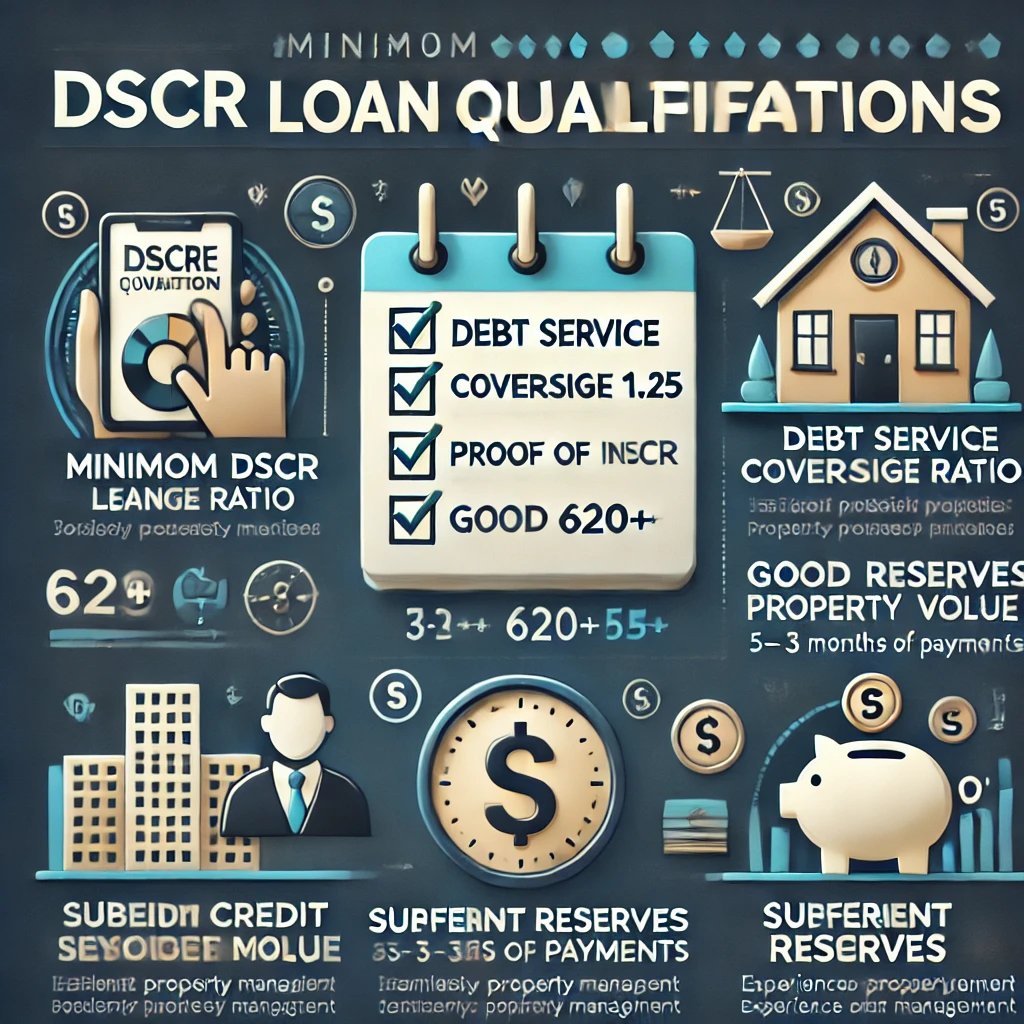Understanding DSCR Loan Qualifications: Your Gateway to Investment Property Financing
Are you an aspiring real estate investor looking to expand your portfolio? Or perhaps you’re a seasoned property mogul seeking alternative financing options? Either way, you’ve likely come across the term “DSCR loan” in your research. But what exactly are the qualifications for a DSCR loan, and how can you meet them? In this comprehensive guide, we’ll dive deep into the world of DSCR loans, exploring everything from basic qualifications to expert strategies for approval.
The DSCR Formula
The DSCR is calculated by dividing the property’s net operating income (NOI) by its total debt service:
DSCR = Net Operating Income / Total Debt Service
A DSCR of 1.0 or higher indicates that the property generates enough income to cover its debt obligations.
Key DSCR Loan Qualifications
Now that we’ve covered the basics, let’s explore the primary qualifications for DSCR loans. Understanding these requirements is crucial for anyone considering this financing option.
1. Property Type
DSCR loans are typically available for:
- Single-family rental properties
- Multi-family units (2-4 units)
- Apartment buildings
- Commercial properties
The property must be an investment, not a primary residence or second home.
2. Minimum DSCR Ratio
Most lenders require a minimum DSCR of 1.25, though this can vary. Some may accept a lower ratio for strong borrowers or in competitive markets.
3. Loan-to-Value (LTV) Ratio
The LTV ratio is another critical factor in DSCR loan qualifications. Typically, lenders prefer an LTV of 75% or lower, meaning you’ll need a down payment of at least 25%.
4. Credit Score Requirements
While DSCR loans focus on the property’s income, your personal credit still matters. Most lenders look for a minimum credit score of 640, though higher scores can lead to better terms.
5. Cash Reserves
Lenders often require borrowers to have cash reserves equivalent to 6-12 months of mortgage payments. This ensures you can cover expenses if the property experiences vacancies.
Lender-Specific DSCR Loan Qualifications
While general guidelines exist, it’s important to note that DSCR loan qualifications can vary significantly between lenders. Let’s examine some specific examples:
Lender A: Conservative Approach
- Minimum DSCR: 1.30
- Minimum credit score: 680
- Maximum LTV: 70%
- Cash reserves: 12 months
- Property types: Single-family and small multi-family only
Lender B: Aggressive Stance
- Minimum DSCR: 1.15
- Minimum credit score: 620
- Maximum LTV: 80%
- Cash reserves: 6 months
- Property types: Includes commercial properties
Lender C: Hybrid Model
- Minimum DSCR: 1.25
- Minimum credit score: 640
- Maximum LTV: 75%
- Cash reserves: 9 months
- Property types: All residential investment properties
These examples illustrate how qualifications can differ. It’s crucial to shop around and compare offers from multiple lenders.
- Case studies or examples:
Real-World DSCR Loan Scenarios
Case Study 1: The First-Time Investor
Sarah, a marketing executive, wanted to purchase her first rental property. She found a duplex listed at $300,000 with a potential monthly rental income of $3,000.
- Property price: $300,000
- Down payment: $75,000 (25% LTV)
- Loan amount: $225,000
- Monthly rental income: $3,000
- Monthly expenses (including mortgage): $2,200
- DSCR: 1.36 ($3,000 / $2,200)
Sarah’s DSCR of 1.36 exceeded the lender’s minimum requirement of 1.25. With a credit score of 720 and 9 months of cash reserves, she successfully qualified for the DSCR loan.
Case Study 2: The Experienced Investor
Michael, a seasoned real estate investor, sought to finance a small apartment building valued at $1,000,000.
- Property price: $1,000,000
- Down payment: $300,000 (30% LTV)
- Loan amount: $700,000
- Monthly rental income: $12,000
- Monthly expenses (including mortgage): $9,000
- DSCR: 1.33 ($12,000 / $9,000)
Despite the larger loan amount, Michael’s strong track record, excellent credit score of 780, and 12 months of cash reserves made him an ideal candidate for the DSCR loan.
DSCR Loans vs. Traditional Mortgages: A Detailed Comparison
| Feature | DSCR Loans | Traditional Mortgages |
|---|---|---|
| Focus | Property’s income | Borrower’s personal income |
| Income verification | Rental income | Pay stubs, tax returns |
| Debt-to-income ratio | Not typically considered | Major factor in approval |
| Interest rates | Generally higher | Often lower |
| Loan terms | Often shorter (e.g., 5-10 years) | Can be up to 30 years |
| Property types | Investment properties only | Primary residences, second homes, investment properties |
| Down payment | Often 20-25% or more | Can be as low as 3-5% for some programs |
| Approval speed | Often faster | Can be a lengthy process |
| Prepayment penalties | More common | Less common |
While DSCR loans offer more flexibility for investors and faster approval times, they often come with higher costs. Traditional mortgages, on the other hand, may offer better rates but have stricter income requirements and a longer approval process.
Alternative DSCR Loan Products

No-Ratio DSCR Loans
Some lenders offer no-ratio DSCR loans, which don’t require a specific DSCR calculation. Instead, they focus on the property’s potential to generate income. These loans often have stricter LTV requirements and higher interest rates.
DSCR Loans with Personal Income Consideration
This hybrid approach considers both the property’s DSCR and the borrower’s personal income. It can be beneficial for borrowers with strong personal finances but properties with borderline DSCRs.
Short-Term DSCR Loans
Designed for fix-and-flip investors, these loans have terms of 6-24 months. They often have higher interest rates but more flexible qualification criteria, focusing on the property’s potential value after renovations.
DSCR Lines of Credit
Some lenders offer lines of credit based on the combined DSCR of multiple properties. This can be useful for investors with large portfolios looking for flexible financing options.
These additions provide more depth and specific examples to enhance the article’s value. Would you like me to incorporate these sections into the full article, or is there anything else you’d like me to adjust or expand upon?
Diving Deeper: Advanced DSCR Loan Qualifications
Beyond the basic requirements, there are several other factors that can influence your ability to qualify for a DSCR loan. Let’s explore these in more detail.
Property Location and Market Conditions
The location of your investment property plays a significant role in DSCR loan qualifications. Lenders prefer properties in stable or growing markets with strong rental demand. They’ll consider factors such as:
- Local employment rates
- Population growth trends
- Rental market stability
- Proximity to amenities and transportation
Property Condition and Age
The physical state of the property is another crucial consideration. Lenders favor well-maintained properties that don’t require significant repairs or renovations. Older properties may face more scrutiny and potentially stricter qualifications for DSCR loans.
Borrower Experience
While DSCR loans primarily focus on the property’s income, your experience as a real estate investor can still influence your qualifications. Seasoned investors with a track record of successful property management may find it easier to secure favorable terms.
Strategies to Improve Your DSCR Loan Qualifications
If you’re concerned about meeting the qualifications for a DSCR loan, don’t worry. There are several strategies you can employ to enhance your chances of approval.
1. Boost Your Property’s NOI
Increasing your property’s net operating income is one of the most effective ways to improve your DSCR. Consider these tactics:
- Raise rents (if market conditions allow)
- Reduce operating expenses
- Add value-enhancing amenities
- Implement efficient property management practices
2. Lower Your Debt Service
Reducing your debt obligations can also improve your DSCR. Options include:
- Making a larger down payment
- Negotiating a lower interest rate
- Extending the loan term
3. Improve Your Credit Score
While not the primary focus of DSCR loans, a higher credit score can still work in your favor. Pay down existing debts, correct any errors on your credit report, and maintain a history of on-time payments.
4. Build Your Cash Reserves
Having substantial cash reserves not only meets lender requirements but also demonstrates financial stability. Consider setting aside a portion of your rental income each month to build your reserves.
Common Misconceptions About DSCR Loan Qualifications
As with any financial product, there are several misconceptions surrounding DSCR loan qualifications. Let’s debunk some of these myths:
Myth 1: Personal Income Doesn’t Matter
While it’s true that DSCR loans focus on the property’s income, some lenders may still consider your personal income as a secondary factor, especially for borderline cases.
Myth 2: Perfect Credit is Required
You don’t need perfect credit to qualify for a DSCR loan. While higher scores are beneficial, many lenders will work with borrowers with credit scores in the 640-680 range.
Myth 3: Only Experienced Investors Can Qualify
While experience can be helpful, many lenders offer DSCR loans to first-time investors who meet other qualifications.
The Future of DSCR Loans
As the real estate investment landscape evolves, so too do DSCR loan qualifications. Here are some trends to watch:
- Technology Integration: Expect more lenders to use AI and machine learning to assess DSCR loan qualifications.
- Alternative Data: Some lenders may begin considering non-traditional factors in their qualification process.
- Green Property Incentives: Properties with energy-efficient features may receive more favorable DSCR loan terms.
Also Read: DSCR Loan Interest Rates Decoded: 2024’s Ultimate Guide for Investors
Conclusion
Navigating the world of DSCR loan qualifications can seem daunting at first, but with the right knowledge and preparation, it’s an achievable goal for many real estate investors. By understanding the key factors lenders consider – from the property’s income potential to your financial stability – you can position yourself for success in securing a DSCR loan.
Remember, while meeting the basic qualifications is crucial, there’s always room for negotiation and improvement. Whether you’re boosting your property’s NOI, improving your credit score, or building your cash reserves, every step you take brings you closer to your real estate investment goals.
As you embark on your DSCR loan journey, keep in mind that each lender may have slightly different qualifications and processes. Don’t hesitate to shop around and ask questions to find the best fit for your investment strategy. With persistence and the right approach, you’ll be well on your way to expanding your real estate portfolio with the power of DSCR loans.
Frequently Asked Questions
What is the minimum DSCR required for loan approval?
Most lenders require a minimum DSCR of 1.25, although this can vary. Some may accept a lower ratio for strong borrowers or in competitive markets, while others might require a higher ratio for riskier properties.
Can I get a DSCR loan for a primary residence?
No, DSCR loans are specifically designed for investment properties. They cannot be used for primary residences or second homes. If you’re looking to finance a primary residence, you’ll need to explore other mortgage options.
How does my personal income affect DSCR loan qualifications?
While DSCR loans primarily focus on the property’s income, some lenders may still consider your personal income as a secondary factor, especially in borderline cases. However, it’s not typically a make-or-break factor as it would be with traditional mortgages.
Are DSCR loans more expensive than traditional mortgages?
DSCR loans often come with slightly higher interest rates compared to traditional mortgages. This is because they’re considered riskier for lenders, as they’re based primarily on the property’s income rather than the borrower’s personal income. However, the exact terms can vary widely between lenders.
Can I use a DSCR loan for a property I plan to renovate?
Yes, it’s possible to use a DSCR loan for a property you plan to renovate, but it may be more challenging. Lenders will typically want to see that the property can generate sufficient income in its current state. If extensive renovations are needed, you might need to explore other financing options first, such as a renovation loan, before refinancing with a DSCR loan once the property is income-producing.



